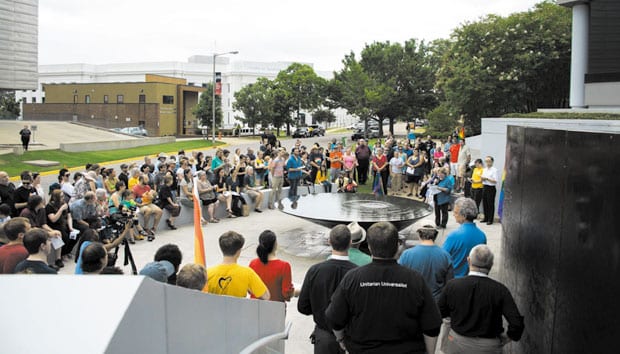 When Orlando residents awoke to learn the deadliest mass shooting in U.S. history took place at a gay nightclub in their city overnight, many reacted with shock and disbelief.
When Orlando residents awoke to learn the deadliest mass shooting in U.S. history took place at a gay nightclub in their city overnight, many reacted with shock and disbelief.“I was stunned,” said Robin Brown, a former Amnesty International official who retired and moved to the Florida community nine years ago from Washington, D.C. “I had difficulty processing the enormity of the whole thing.”
No stranger to the phenomena of violence because of her work on Amnesty International education campaigns addressing topics such as brutality against women and LGBT discrimination, Brown and others thought of Orlando as not the type of community where mass violence would erupt.
“It tore me up,” said Brown, a Texas native who lived in Dallas for 20 years before she and her husband and children moved to D.C. “I felt anger, but I felt great sadness at the same time.”
In the aftermath of the tragedy that occurred at closing time for the bar, members of the community began coming together to heal and help others recover from the shock and bewilderment, Brown said. Thousands lined up to donate blood for the 50-plus wounded in the massacre that left 49 dead on the floors of the nightclub known as Pulse.
“It’s not just the gay community responding and attending vigils and offering prayers,” Brown said. “It is everyone.”
Brown noted her son and two grandchildren, who also live in the Orlando area, posted Facebook messages in support of the LGBT community and in condemnation of anti-gay bigotry and violence. “It’s like, ‘How dare you mess with our community?’” she said. “It’s like that for many people.”
Southern Poverty Law Center President Richard Cohen said the feelings of horror experienced in Orlando and in cities across the country, in both the LGBT communities and populations as a whole, come as no surprise. Hate crimes send shock waves through people who share characteristics with the targets of violence as well as their families and friends. He described hate crimes as terroristic events.
 “I think America is in shock,” Cohen said of the nation’s reaction to the number of people gunned down by the shooter, a 29-year-old American citizen whose parents emigrated from Afghanistan and who called 911 after the attack to express his solidarity with radical Islamic philosophy. “It’s a good moment for everyone to come together and embrace. I hope that is what happens.”
“I think America is in shock,” Cohen said of the nation’s reaction to the number of people gunned down by the shooter, a 29-year-old American citizen whose parents emigrated from Afghanistan and who called 911 after the attack to express his solidarity with radical Islamic philosophy. “It’s a good moment for everyone to come together and embrace. I hope that is what happens.”SPLC hosted a vigil at the Civil Rights Memorial in Montgomery, Ala., for the local LGBT community and its friends the night after news of the tragedy broke, said Cohen, who has a gay son.
Cohen said the nation’s LGBT community is experiencing a backlash as a result of its gains in the area of marriage equality and other civil rights. Conservative legislators across the country are introducing religious freedom bills in their states in an effort to provide churches the “freedom to discriminate,” he said.
In a few hours after news of the gay nightclub deaths broke, white supremacist groups across the nation began online attacks against the LGBT community and all immigrants. One said he hoped for as many casualties as possible, and another said he hoped it would signal the start of a “terrorist/faggot” civil war.
Cohen said the targeting of a gay nightclub represents an attack on all of America. “It’s hard to believe this was a random target,” he said. “Radical Muslim extremists believe gay bars represent the height of American decadence.”
President Obama made the same comparison in his national address to the American public, saying “An attack on any American is an attack on all Americans.” The shootings came two weeks after Obama declared June “Lesbian, Gay, Bisexual and Transgender Pride Month.”
Law enforcement officials suspect the Orlando gunman staked out the nightclub in advance of driving to it from his home in Fort Pierce Saturday night to kill as many people as possible.
Curiously, two days after the shootings reports began surfacing in the media about the killer being a frequent visitor to the nightclub and posting a profile on a gay dating site. That led to speculation about internalized homophobia.
SPLC documented an incident in Seattle in 2014 where a Muslim extremist tried to torch a crowded gay bar, Cohen said. “The fire was quickly put out,” he said. “There could have been a horrific loss of life.”
FBI Director James Comey urged the nation’s LGBT community in a national press conference to stay strong but to be aware of their surroundings in the event of more violence. LGBT people are more likely to be the victims of hate crimes than any other group of people, according to SPLC and FBI statistics.
In Orlando, Brown said she is optimistic the community will recover. A retail store near her residence lost three employees in the massacre, she said. “I think it may take a while, but I see it as a chance for us all to come together.”
This article appeared in the Dallas Voice print edition June 17, 2016.













